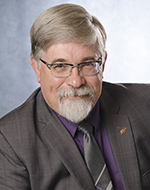Page Content
Bill 24, An Act to Support Gay –Straight Alliances, has passed third reading in the Alberta legislature and has generated a fair amount of discussion on the topic of gay–straight alliances (GSAs) and how schools are being maintained as safe and welcoming environments for sexual and gender minority students.
–Straight Alliances, has passed third reading in the Alberta legislature and has generated a fair amount of discussion on the topic of gay–straight alliances (GSAs) and how schools are being maintained as safe and welcoming environments for sexual and gender minority students.
During these discussions, I received a lot of questions from teachers and members of the public about the Alberta Teachers’ Association’s position.
In order to fully explain the ATA’s position, we must go back to 2015, when the then Progressive Conservative government passed its Bill 10 — An Act to Amend the Alberta Bill of Rights to Protect Our Children — with all-party support in the house. Given the bill’s provisions concerning the creation of GSAs, the Association issued a news release calling for some regulatory clarity around this aspect. Then ATA president Mark Ramsankar noted that there were widely divergent views from government, school boards and others on what Bill 10 would mean in practice.
“The principals, teachers and students who will be involved need to know very clearly where they stand,” he said.
The ATA responded to the emergent implementation questions by calling for ministerial orders that would provide clarity, support and protection for students and teachers. The ATA advocated for regulations that would allow students to determine the name of the GSA, confirm the rights of students and teacher advisors to determine the activities of GSAs, and protect principals and teachers who support the work of the GSA from any employment repercussions. Our release also urged the government to legally prevent the disclosure of a student’s membership in a GSA without the explicit prior consent of the student.
The solutions proposed by President Ramsankar in the winter of 2015 were affirmed by teachers at the 2015 Annual Representative Assembly and became official Association policy with the overwhelming support of delegates. The Association believed that these solutions were essential to ensure that GSAs could effectively deliver on their stated purpose — ensuring that sexual and gender minority students feel safe and welcome at school.
Protections in Bill 24 align with teachers’ views Bill 24 allows teachers to point to the law and tell students and parents clearly — student privacy, safety and security come first.
|
That purpose is significantly eroded if students who can benefit from the support of a GSA find that barriers prevent their access. In some cases, those barriers are self-imposed and in some cases they may be unjustified, but for some students, just the risk of disclosure will prevent them from participating in a GSA and getting the in-school support that they require. Student privacy is an essential condition for the success of GSAs.
In the two years since Bill 10 passed, it has seemed like many of these issues were being effectively managed. Even the student privacy matter became essentially moot, as provisions precluding parental disclosure exist in teachers’ professional code of conduct and provincial privacy legislation. However, the issue did not die.
A campaign by Parents for Choice in Education called for mandatory notification and explicit parental permission on extracurricular activity and the use of materials or resources related to sexuality and gender identity.
The campaign gained traction amongst some, and we ended up in a situation in which the legal protections for student privacy were considered to be uncertain. And so, when the government introduced Bill 24 to bring in that certainty, we welcomed it.
Bill 24 speaks to changes that address essentially all of the concerns highlighted in Association policy. Legal clarity will be helpful for teachers and principals. Teachers should not have to worry about managing competing pressures and judging uncertain risks related to such a sensitive topic. Bill 24 allows teachers to point to the law and tell students and parents clearly — student privacy, safety and security come first.
I appreciate that, in its response to Bill 24, the United Conservative Party opposition has pointed to respect for the professional judgment of teachers as their reason for not supporting the bill. Of course, I also respect the professional judgment of teachers and generally support freedom for teachers to exercise their professional judgment. I look forward to talking to the UCP leader, education critic and other MLAs about enhanced support for teacher judgment, especially when it comes to curriculum, assessment and other areas of teacher practice.
But on this issue, the profession has already considered the questions, and teachers decided that they would prefer to have legal clarity through law. ❚
